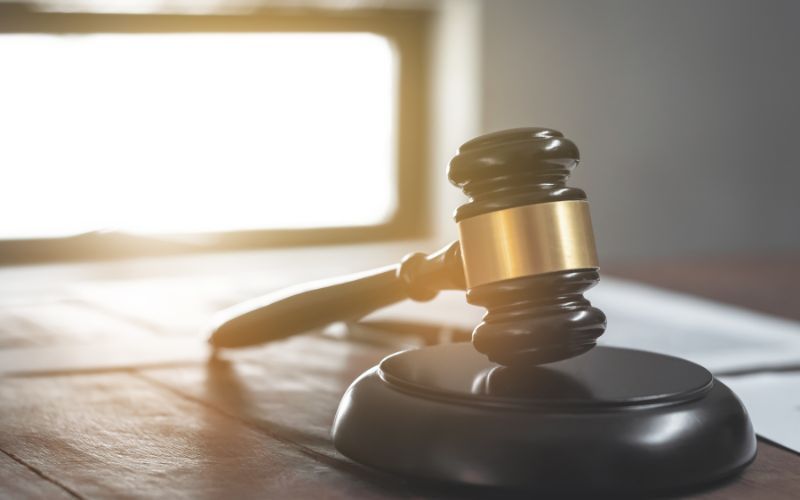Last Updated: July 18, 2024
What You Need to Know About Unknown Judgments

Disclaimer: We are not qualified legal or tax professionals and are not giving advice. Always speak with a qualified professional before making any legal or financial decisions.
If your wages are being garnished unexpectedly, you might be facing a judgment from a debt collection lawsuit that you weren't aware of. This can happen if you didn't receive the original summons due to an outdated address or improper service, or if you missed a court date.
If a judgment has been entered against you without your knowledge, it's important to act quickly. There are specific legal procedures for serving summons in these cases, and if yours wasn't handled correctly, you may have grounds to challenge the judgment.
Read on to learn how to contest an unknown judgment and protect your rights against unexpected debt collection actions.
Eager to talk now? Skip the article and secure a free consultation with a debt specialist.
What Does a Judgment Against Me Mean?
In debt collection lawsuits, a judgment is a legal decision defining the rights and liabilities of involved parties. Six distinct types of judgments can result from these cases, each with unique implications. Understanding these is crucial for anyone facing potential debt collection actions.
The first three types are Confession of Judgment, where the debtor admits to the debt; Consent Judgment, where the debtor acknowledges the debt but can't pay immediately; and Default Judgment, issued when the debtor fails to appear in court. Each of these can significantly impact the debtor's financial situation and legal standing.
The remaining types of debt collection lawsuits include Summary Judgment, Trial by Jury/Bench, and Arbitration Award. These involve court orders, formal trials, or third-party decisions. While this information provides a general overview, it's advisable to consult an attorney for specific guidance on debt collection lawsuits and related documents.
How Judgments Can Impact Your Finances and Credit
In the past, a judgment, with or without your knowledge, was against you damaging your credit score and history. This is no longer the case. However, several factors associated with judgments can affect your finances and credit report.
The damage to your credit report is done before you end up with a judgment. The summons was issued because of non-payment of the debt, and that non-payment hurts your credit score.
If there is an unexpected judgment, you can end up with bounced checks or returned payments for insufficient funds. This can cause additional missed payments that damage your credit report further.
Wage garnishments and frozen bank accounts can create financial hardships. There are limits on what the court can order seized, so if you did not show up to the court hearings, the court could not protect the mandatory amounts in your accounts or wages.
How Can a Judgment Happen Without My Knowledge?
Mistakes can happen, especially if you have moved or not kept your creditors up-to-date with your current address.
We will outline the steps that the creditor and court must take.
- You should receive a Demand letter. This letter explains that you owe money, collections have been attempted, and the creditor or debt collector plans to take legal action against you. If you get one of these, respond immediately. You can find directions are on this article.
- The creditor (plaintiff or judgment creditor) files a Summons and Complaint
- The court processes the filing
- The Summons is sent to the debtor (defendant or judgment debtor)
- The defendant has a brief time period to respond. Instructions are included in this article. Do NOT ignore this summons, or there will be a default judgment against you
- The lawsuit is heard in court
- The court renders a judgment that can include the following:
- Wage garnishment
- Payment plan
- Attachment of liens on the property (this means you must turn over proceeds from selling the property to the plaintiff)
While most creditors need court approval to garnish wages or freeze accounts, government entities can do so without court involvement for unpaid taxes or child support. They must, however, provide written notice. To avoid missing crucial notifications that could lead to a debt collection lawsuit, keep your contact information current with creditors. This also prevents debt collectors from contacting your employers or family.
Ignoring demand letters or summons can have severe consequences. These documents often precede a debt collection lawsuit, and failing to respond makes reversing any judgment difficult. Regularly check your credit report for errors or unpaid bills to address issues before they escalate. Being informed and responsive is your best defense against unexpected legal actions related to debt collection.
How to Discover if There is a Judgment Against You
Staying proactive can help you avoid unexpected financial consequences. Regularly check your credit report and monitor public records to detect any pending debt collection lawsuits. This vigilance can alert you to issues before they escalate.
If you discover a debt collection lawsuit against you, promptly request copies of relevant records. Remember, maintaining accurate information and an up-to-date address with creditors is crucial to prevent missed notifications and unwelcome legal surprises.
You can also use a people search tool, which can be expensive.
Finally, always pay your bills, balance your checking account, and pay attention to your mail.
What to Do If You Discover a Judgment Against You
Upon discovering a judgment against you, contact the issuing court for all relevant paperwork. If the judgment was made in error or you never received a summons, consider seeking legal counsel to guide you through the reversal process. In cases of a valid debt collection lawsuit judgment, you may opt to contact the creditor or debt collector to negotiate a settlement.
Whether arranging a payment plan or offering a lump sum, ensure all agreements are documented in writing, keep records of payments, and obtain a letter confirming the debt's resolution. With this documentation, you can then petition the court to resolve the judgment.
If you cannot, you may need the professional services of a debt settlement company like Pacific Debt Relief to negotiate your debt for you.
FAQs
Conclusion
Staying vigilant is key to avoiding unexpected judgments against you. Regularly check your credit reports through Experian, TransUnion, or Equifax to catch any discrepancies early. If you discover signs of a debt collection lawsuit, address it immediately. Don't ignore demand letters or summons, as these could be precursors to legal action.
Seek legal assistance if needed to navigate the complexities of financial disputes. By staying proactive, correcting errors promptly, and maintaining timely bill payments, you can protect yourself from unexpected judgments. Remember, addressing issues early can help you avoid the serious consequences of an uncontested debt collection lawsuit.
If you are overwhelmed with debt, get a FREE consultation with a debt specialist today!
*Disclaimer: Pacific Debt Relief explicitly states that it is not a credit repair organization, and its program does not aim to improve individuals' credit scores. The information provided here is intended solely for educational purposes, aiding consumers in making informed decisions regarding credit and debt matters. The content does not constitute legal or financial advice. Pacific Debt Relief strongly advises individuals to seek the counsel of qualified professionals before undertaking any legal or financial actions.
Reduce Your Credit Card Debt By Up to Half

BBB Reviews | 4.9/5.0 Rating









 Do Not Sell My Personal Information
Do Not Sell My Personal Information